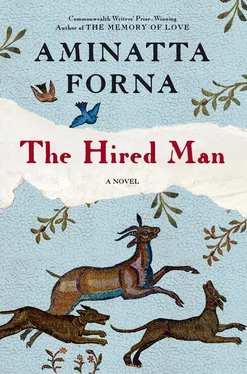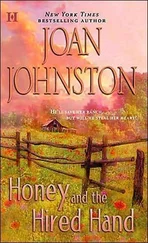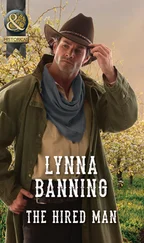By the middle of the day Grace had uncovered most of the mosaic. She showed me her work and I, in turn, made a show of being impressed. ‘It’s a bird,’ said Grace, unnecessarily.
The bird rose, neck outstretched, trailing a tail of red and yellow. The body of the bird was red, the outspread wings were blue, very close to the blue of the paintwork of the house, except for the feathered ends which were the blue of azure, like the sky an evening before. The bird wore a crown of gold, and from its uplifted beak came curls of gold breath. It flew straight upwards into a white sky, the tiles arranged in cloud-like whorls. And below the bird, two hands outstretched. They might be trying vainly to touch the beautiful bird, or equally they could belong to the person who had just released it.
‘I think it’s beautiful,’ said Grace.
I said, ‘It is.’
‘Weird that someone would cover it up.’
‘Maybe they thought it wouldn’t appeal to everyone and they wanted to sell the house.’
‘There’s more on the bottom of the fountain.’
Just as I had returned to work at the back of the house a car came down the lane. The road led to nothing except a collection of farm buildings a half-kilometre or so on and it could also be used as a cut through to a small hamlet four or five kilometres away, but that was it. Have I mentioned that? I don’t think so. The point is that there was very little traffic down it and the few cars there were tended to speed. This one, an old Vauxhall, cruised slowly past much as the car driven by the woman who worked in the supermarket had the day before.
I finished work, stowed my brushes and stood before the pile of things pulled from the outbuilding. This time I helped myself to two of the paperbacks. I tend to eat early and after I’d cooked I settled down with the remainder of the bottle of wine. Reading has always been a pleasure, but after the first few pages I felt the wind change and got up to close the shutters just as the rain started. It rained hard for twenty minutes and then stopped and when it did some of the light had returned to the day. My mood had changed with the wind: a restlessness. I collected my shotgun, called the dogs and set off to the hills to scout for rabbits.
Whenever I think back to that time it is with the taste of rabbit flesh in my mouth. Anka must have been about eight years old when she first started to come with us. She was impressive from the start with none of the squeamishness, real or fake, of girls of our own age, nor though did she have any of the fascination with death which Krešimir and I shared. We would return to the scene of a carcass over and over again, watching as it dropped through the stages from rigor mortis to bones, the sweet stink of putrefaction. I remember once deformed piglets born to one of the farmers: Siamese twins, they didn’t live long, but every day they lived we ran straight from school to see them. They were joined at the belly and the chest and looked like they were dancing. They snuffled around, the stronger one unable to right itself because of the weaker sibling attached to it. The farmer sometimes helped them onto the teat, prodding them with a stick; he had no intention of keeping them alive but was enjoying the attention for a while. I remember the thrill it gave me to see them: a tightening in my balls.
By then Anka was ten and we tolerated her on our expeditions knowing it was the only way she could escape the eye of her mother, a chain-smoking beauty who’d outgrown her husband and viewed Anka not as a child but a miniature version of herself: a miniature, slower, stupider version of herself.
Anka liked to carry Krešimir’s gun. Normally Krešimir didn’t like anyone to touch his gun (any of his belongings), but he enjoyed her devotion. When he was ready, he’d silently extend his arm behind him and snap his fingers. Anka would run quickly forward and lay the gun across his palm.
Twenty minutes we’d been out, climbing the slope above the tree line below the old bunker, where that year we’d had most success. A rabbit broke cover fifty metres or so ahead of us. Anka, carrying Krešimir’s gun, lifted it to her shoulder and fired. The animal tumbled twice and lay still. Krešimir and I stopped talking mid-sentence and stood with our mouths hanging open. The shot had practically whistled through our hair. Krešimir was proud of her, you could see it in his face. Anka’s father bought her a shotgun of her own against the wishes of his wife. A 410 with a clover leaf engraved on the stock.
I was fourteen that year and had taught myself how to cure rabbit skins. In the loft at home I had eight or ten skins, from which I’d scraped the fat and which I had stretched out on wooden frames. When the skins were ready I made them into hats like the ones Canadian trappers wore. I made quite a bit of money that way. So Anka’s first rabbit I turned into a hat for her and that winter she wore it all the time, though Krešimir told her she’d catch fleas from it.
‘He seemed very excitable,’ Laura told me. ‘At first I had no idea who he was, then I recognised him as the man we collected the keys from the day we arrived. He parked on the other side of the road and Grace said he gave her the fright of her life coming right up behind her. He seemed to be saying something about the mosaic. She started to call for me, but he banged on the door so I invited him in for a cup of coffee. I assumed he’d come to see how we’d settled in, but the next time I looked round he wasn’t there. He was outside standing in front of the mosaic, waving his arms about. I couldn’t understand a word he was saying. I almost sent Grace to run and fetch you.’ I imagined Laura smiling at Krešimir, a smile full of warmth, as though she was waiting, with immense patience, for him to learn to speak English. ‘I tried to explain how delighted we’d been to find it. It’s a beautiful mosaic. Then suddenly he calmed down and we shook hands, he climbed back into his car and that was it. Do you have any idea what it might have been about?’
‘No,’ I said. ‘Perhaps it’s very valuable and he didn’t know it was there, so now he wants the house back.’
Grace snorted and Laura laughed and looked at me in surprise. ‘Dear Duro, I do believe that’s the first time I’ve heard you tell a joke.’
After that Laura seemed to forget about Krešimir. His visit had taken place on Friday evening. I’d not been expected to work at Laura’s house on Saturday, but I’d promised Grace I would show her the swimming hole. Laura said she would come too and told me Matthew was certain to want to join us. I brought Kos and Zeka because they have a love of the water and I’d neglected them this past week.
‘Will we really have it all to ourselves?’ asked Grace.
‘Yes.’
‘How come?’
‘Most people don’t know the swimming hole is there. Those who did have forgotten.’
‘Why would they forget?’
‘My English is very bad, forgive me. What I mean is that we went to this place as children. That was a long time ago. The children of Gost no longer go there. Times are different and it is a long way to walk, maybe thirty minutes.’
In the event it took us nearly an hour. I’d measured the time according to my own pace. Laura brought towels, an ice box of drinks and a basket full of sun-creams and magazines. We followed the marks of a tractor through the grass: sun-hardened chevrons of soil, and when the tracks ended we fanned out, sending up small clouds of butterflies from the flowers. Ahead of us stood a single row of trees: sentries to the hills, behind the trees a solitary hill stood to the fore, tightly forested with steep, sloping and almost perfectly symmetrical sides, which coupled with its isolation made it look almost man-made. We reached it in twenty minutes, skirted the base and entered the woods beyond and began to climb. Laura and Grace kept up the conversation most of the way, though with the uphill work the silences grew. Matthew had come along, though he walked a little apart from the rest of us, minding his own business. Zeka and Kos ran ahead, seeking quarry but noisily, without any real conviction because we never hunted at this time of day.
Читать дальше












